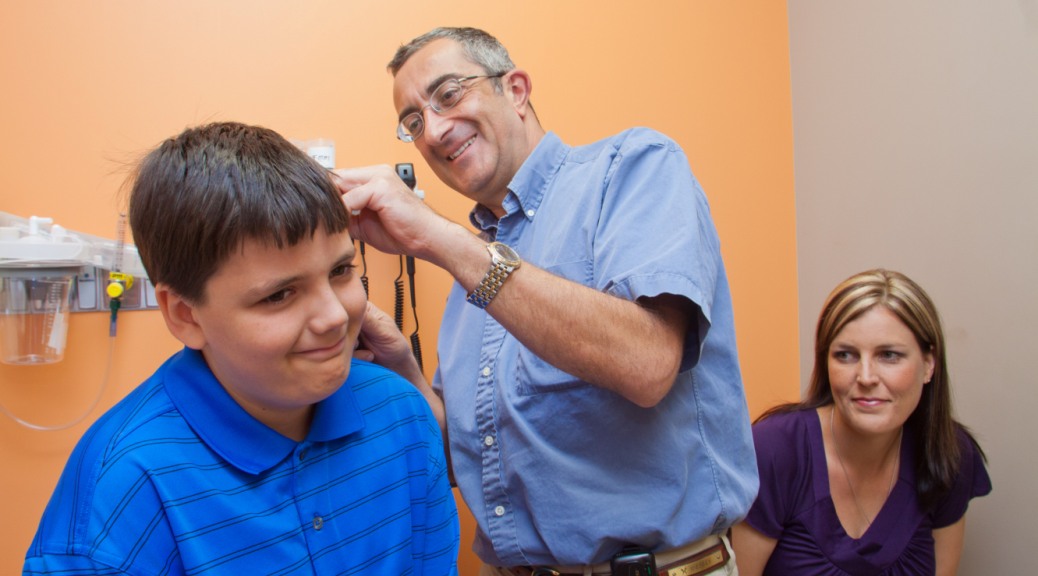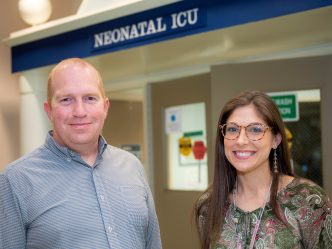AUGUSTA, Ga. – Resolutions, resolutions. From quitting smoking to losing weight, each new year brings the opportunity to wipe the slate clean and start fresh.
 “Parents tend to set personal goals, but they are not as quick to set or contemplate goals for their children,” said Dr. Charles Linder, Pediatrician-In-Chief at Children’s Hospital of Georgia and Interim Chair of Pediatrics at the Medical College of Georgia at Georgia Regents University. “But there are things you can focus on to improve wellness and quality of life for both you and your family in 2015.”
“Parents tend to set personal goals, but they are not as quick to set or contemplate goals for their children,” said Dr. Charles Linder, Pediatrician-In-Chief at Children’s Hospital of Georgia and Interim Chair of Pediatrics at the Medical College of Georgia at Georgia Regents University. “But there are things you can focus on to improve wellness and quality of life for both you and your family in 2015.”
Here are 10 resolutions that Children’s Hospital of Georgia physicians encourage you to commit to in 2015 in order to maintain a healthier lifestyle:
1. Provide a safe environment. Take steps to make sure your home, car, school, and other environments are child-friendly and safe. Use car seats and seat belts for appropriate ages and sizes. Keep hazardous materials and objects in locked areas and out of your children’s reach. “Keep medications and weapons locked away,” Linder said. “We hear about so many accidents involving guns in the home, and these are preventable tragedies.”
2. Live tobacco free. Smoking and exposure to secondhand smoke are harmful to you and your family as are other tobacco products and electronic cigarettes. Make this the year to quit. Talk to your doctor about smoking cessation.
3. Be physically active. Encourage your kids to be active for at least one hour every day. Include activities that raise breathing and heart rates and that strengthen muscles and bones. “Find fun, safe, activities that you can do as a family, like walking or riding bikes,” advises Linder.
4. Get some sleep. How you feel and perform during the day is related to how much sleep you get the night before. “Sufficient sleep is increasingly being recognized as an essential aspect of chronic disease prevention and health promotion,” said Linder. “Sleep needs vary from person to person and from adults to children, so check with your primary care physician if you are unsure how much sleep is required for you and your children.”
5. Set and keep routine checkups. “Go to the doctor regularly. Don’t just go when you are ill,” Linder urges. Routine checkups, including dental and eye exams, help identify ways to stay healthy, provide the opportunity to receive preventive care, and often uncover health problems early when treatment is most effective.
6. Stay current on immunizations. “Nobody really likes getting a shot, especially children, but timely immunizations help prevent diseases and save lives,” said Linder. Keep a record of your family’s vaccinations so you can stay up-to-date with CDC recommendations. Linder also recommends that adults ask about vaccinations for shingles, pneumonia, and other illnesses that are now requiring boosters in adulthood. If you have questions, ask your doctor.
7. Maintain a healthy diet. Obesity is a major health issue for children and adults in the United States. Resolve to serve healthy meals and snacks to your family, and teach children to choose meals and snacks wisely. How can you tell good snacks from bad? Linder recommends eating snacks that require washing, peeling, and/or slicing, such as raw fruits and vegetables. “If it comes in a bag, box, can, bottle, or wrapper, then it’s probably not healthy,” said Linder. Be sure to watch portion sizes, too.
8. Monitor your children. “Essentially this is the primary role of parenting – to ‘parent’ your children,” said Linder. Kids learn – both good and bad lessons – from family, friends, media, school, and other influences. Know who they spend time with, what they’re doing, and if the activities are appropriate. Limit TV and non-essential computer time. “And get familiar with Facebook, Twitter, and the like in order to carefully monitor or limit social media activity if you choose to allow your children to participate.”
9. Nurture your family. Kids need the support and love of family and friends. Converse with your children regularly and show them you care about what’s going on in their lives. Respond to their physical and emotional needs. “It’s important for kids to grow in a safe, loving, and secure environment. Examine your schedule. If you are overextended, perhaps you should cancel or reschedule less important engagements in order to spend quality time with your family.”
10. Practice what you preach. Linder says that one of the best things a parent can do for their children is to model a healthy lifestyle. Teach children to make wise and healthy choices every day, including fastening their seat belts, wearing helmets and protective sports equipment, using sun protection, proper hygiene, and treating others with kindness and respect. “Your children will learn best when you model the good behavior you wish them to show,” said Linder.
While most of these resolutions seem like common sense, Linder said that sometimes what’s most needed is to restate the obvious.
“If you steer your children toward healthy resolutions now, the more likely they are to carry these healthy habits with them into adulthood,” he said.
Editorial Note: Dr. Charles W. Linder is Associate Dean and Professor of Pediatrics Emeritus at the Medical College of Georgia at Georgia Regents University. He is currently serving as Interim Chair of the Department of Pediatrics and Pediatrician-In-Chief of Children’s Hospital of Georgia. He has more than 35 years of service and contributions to pediatrics in Augusta and was instrumental in the establishment of the Children’s Hospital of Georgia, the Division of General Pediatrics and Adolescent Medicine, the Ronald McDonald House, and many other children’s wellness programs. Linder has received numerous awards including MCG’s Distinguished Alumnus Award and the Leila Denmark Lifetime Achievement Award from the Georgia Chapter of the American Academy of Pediatrics. He is a Fellow of the American Academy of Pediatrics, where he has held numerous leadership roles including serving on the Board of Directors.
 Augusta University
Augusta University




